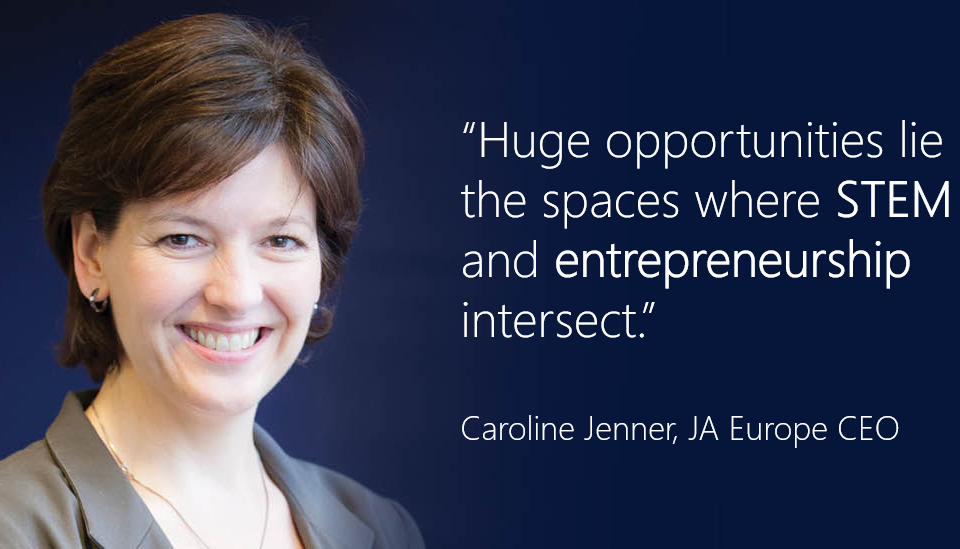In April we announced the renewal of our existing partnership with Junior Achievement Europe (JA Europe), an organization that aims to inspire and prepare young people for success in a global economy and is the region’s largest provider of entrepreneurship education programs.
We recently had the chance to catch-up with Caroline Jenner, JA Europe CEO, about the organization’s work, the partnership with Microsoft and the opportunities and challenges for today’s European youth.
.
JA Europe’s target is young people from age 5-25. We focus on education that fosters entrepreneurship and helps prepare students with the skills and competences they need succeed in the global economy. Our network extends across 39 countries in Europe today and JA Europe is also part of JA Worldwide so there are JA operations in 5 other continents. Altogether, JA Worldwide is reaching 10 million young people of which 30% are in Europe.
.
Digital is a huge part of our current efforts—both in terms of the content we offer to schools and teachers as well as the way we deliver it. Social media is a major component of our outreach to young people, educators and stakeholders. We are right in the midst of the digital transformation that is happening in the education sector: the decisions we make now can have a huge impact on our growth in the future. In fact, we see that we can help bring opportunities to classrooms that would otherwise have to wait a long time. We see learning technologies as a pathway to broadening our impact, increasing our penetration at national level and enabling us to do even more with young people internationally. Working with volunteers from the business community is one of JA’s unique strengths and technology is allowing us to engage even more of them through e-mentoring.
.
First of all, the partnership with Microsoft is one that has grown and evolved over time. Our partnership is highly collaborative. Microsoft shares our mission 100%: they are an organization that has entrepreneurship in its DNA. Microsoft is investing its human capital in JA through volunteering and thought leadership. Microsoft provides us with access to core technologies like Office365 but also has a tremendous portfolio of relevant ICT for learning that we are now working to combine with our programmes. We share a huge geographic footprint too, so Microsoft has played a role helping us expand at national level in a number of countries. Again—the relationship with Microsoft is not just European, it’s global.
.
I’ve thought quite a lot about this. The fact is that the innovations and enterprises of the 21st century and beyond will be in energy, health, sciences, agriculture, climate, big data, smart cities, manufacturing, construction… Focusing young people, particularly from age 14-18, on what these big ‘needs’ are and how their problem-solving skills can make a difference is one of the main ways we can turn them on to STEM related fields. Entrepreneurship allows them to see the big picture and the link with society and the economy. We also have to ensure they interact with role models from these fields as well—this is a built-in part of our programmes. Too many young people abandon these education pathways early on because they’ve only seen the theory and not enough of the reality. The reality is that huge opportunities lie in the spaces where STEM and entrepreneurship intersect.
.
The goal of the ICEE (Innovation Cluster for Entrepreneurship Education) project is to test entrepreneurship education, in particular the most successful method in existence today (mini-companies) at 50% penetration in the school system. We have selected 5 different countries with significant differences in their education systems and we have selected both VET schools and standard secondary schools. It is not just about the impact on the students in terms of their entrepreneurial competences and intentions, but also the impact higher participation rates have on the schools and the stakeholders (systemic impacts). The EU has said that every young person should have an entrepreneurship education experience before they leave school. That’s 100% penetration. ICEE is all about what it’s going to take to achieve that.
.
I would encourage them to persevere and to network like crazy. I would also encourage them to share their experiences with people younger than them who are still at school. Europe needs more entrepreneurs like them. Young entrepreneurs are fantastic role models and their personal stories are inspiring!










